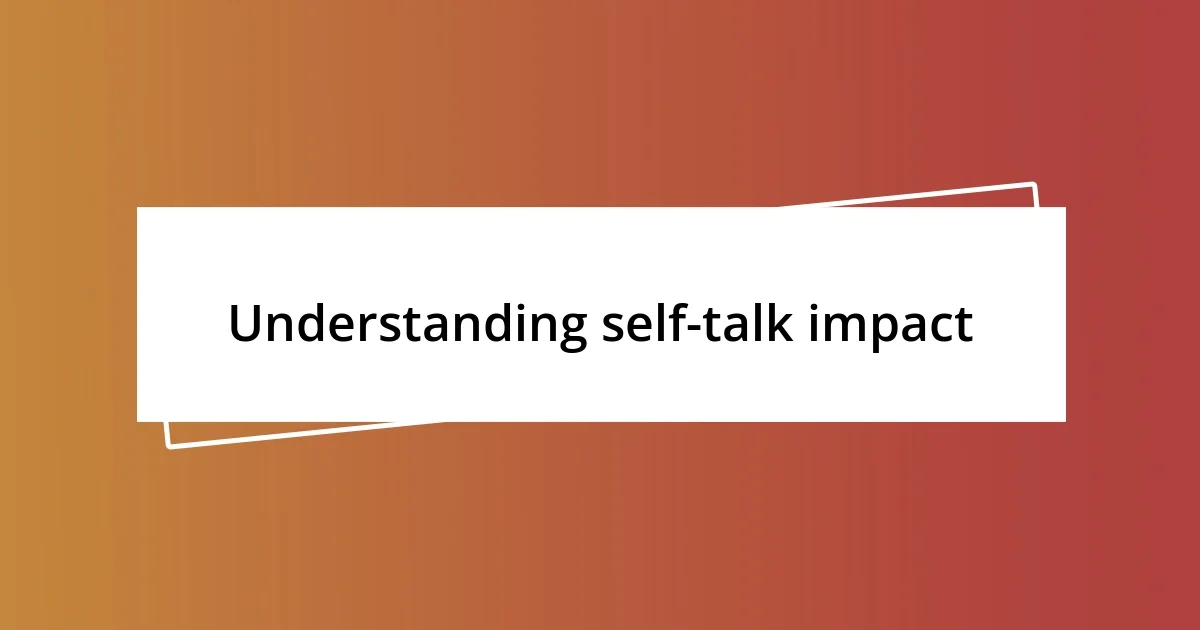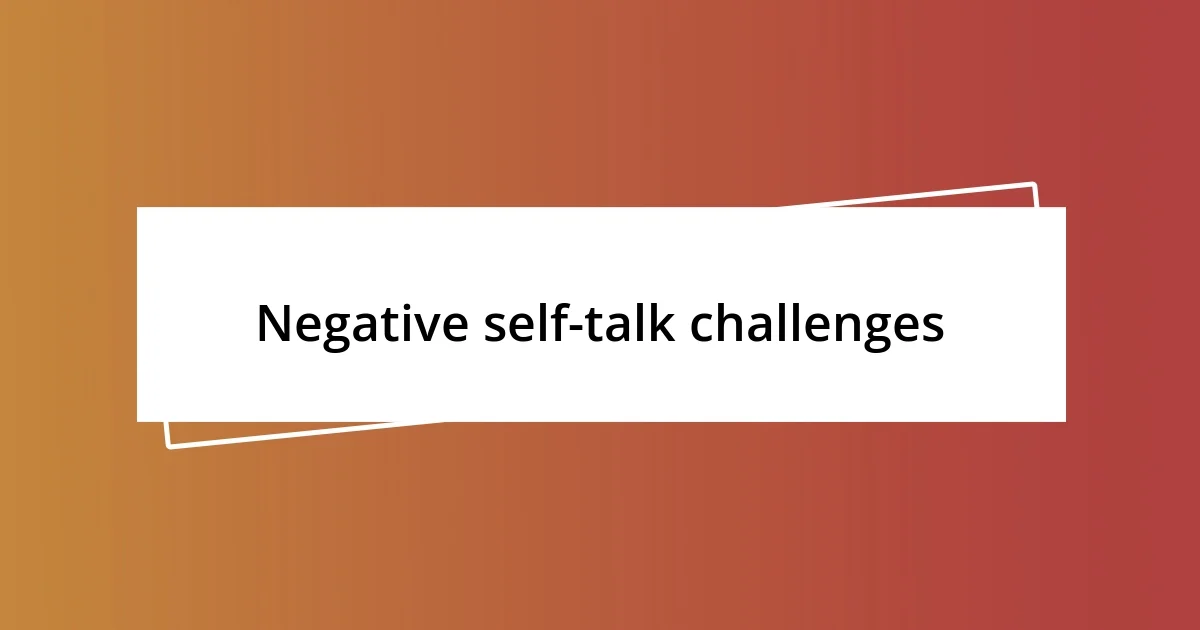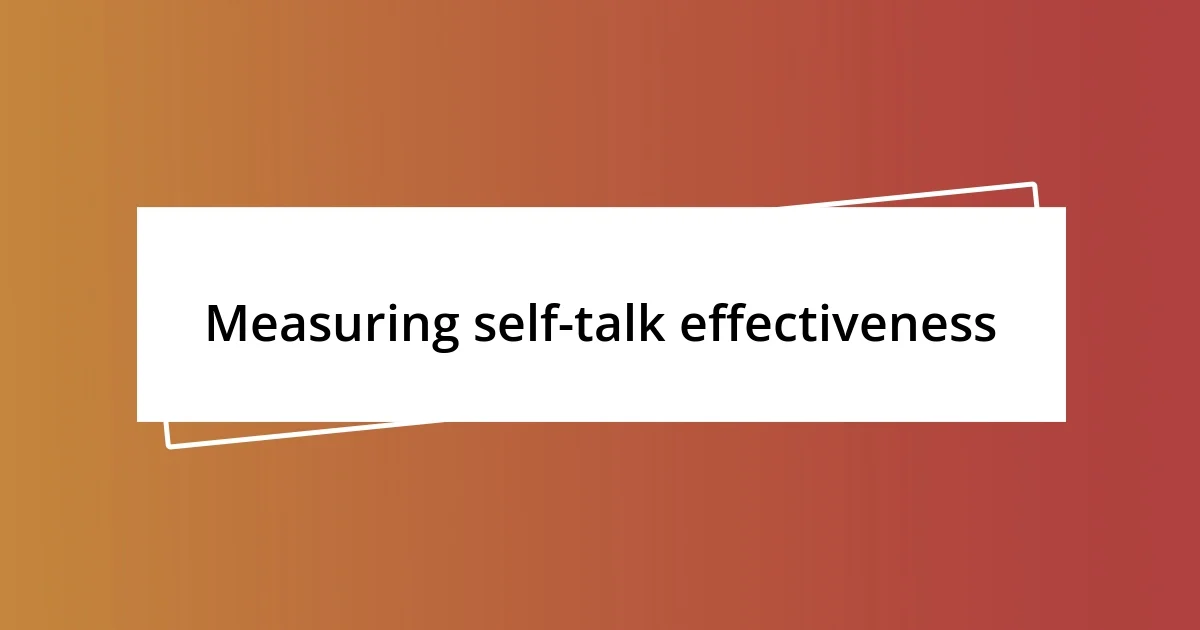Key takeaways:
- Positive self-talk enhances performance by boosting confidence and resilience, while negative self-talk leads to doubt and emotional strain.
- Techniques like visualization, affirmations, and gratitude journaling can effectively transform one’s self-talk and improve overall mindset.
- Measuring self-talk effectiveness through emotional responses, performance reflection, and peer feedback reveals its significant impact on personal growth and external perceptions.

Understanding self-talk impact
Self-talk profoundly influences our performance, often serving as the unseen force behind our actions. I remember a time when I faced a particularly daunting project at work. I could either spiral into negative thoughts, doubting my abilities, or shift my focus to affirming my skills. The latter choice, surprisingly, propelled me to not only complete the project but also exceed my own expectations. Isn’t it fascinating how simply changing the narrative in our heads can lead to such a transformation?
When we engage in positive self-talk, it boosts our confidence and enhances our resilience. I’ve found that reminding myself of past successes, even the small ones, helps me tackle new challenges head-on. For example, during a marathon, instead of fixating on the fatigue, I shifted my self-talk to celebrate my progress and capabilities. It’s almost like having a personal cheerleader in my corner, wouldn’t you agree?
The impact of self-talk extends beyond individual performance; it shapes our overall mindset and emotions. I recall days where my inner dialogue was critical and unforgiving, leaving me feeling drained and unmotivated. In those moments, I learned the importance of crafting supportive phrases to create a more nurturing mental environment. If we can consciously choose to speak kindly to ourselves, what barriers could we break down in our pursuit of success?

Types of self-talk
Self-talk manifests in different forms, each shaping our minds in unique ways. I’ve often noticed three primary types: positive, negative, and neutral. Positive self-talk motivates and uplifts, creating vibrations of confidence. During a particularly tough volleyball match, I repeatedly told myself, “You’ve got this!” It was transformative; I felt powerful moving through my serve. Conversely, negative self-talk activates self-doubt and fear, often saying, “You’ll never measure up,” which I unfortunately have experienced before a big presentation. Neutral self-talk lacks emotional weight, often going unnoticed but still influencing our state of mind. It’s like background noise in an otherwise loud environment—it may not seem significant, yet it can impact your focus.
When I reflect on my experiences, I realize how the context of self-talk can change outcomes. For instance, I used to approach gym workouts with a hesitant attitude, often resorting to neutral or negative phrases like, “I’m never going to lift that weight.” Over time, I shifted my mental chatter to a more positive realm, like, “Every rep is building my strength.” This transition didn’t just improve my performance; the whole vibe of my workouts transformed, making them enjoyable rather than a chore.
It’s interesting to consider how each type of self-talk affects not just abilities but also our emotional landscape. Think about a time when you were feeling down and your inner critic was running rampant. I remember feeling anxious about an upcoming job interview, letting negative thoughts spiral out of control. Once I caught myself, I consciously practiced a blend of positive affirmations and neutral observations, like, “I’ve prepared well,” which calmed my nerves and refocused my energy.
| Type of Self-Talk | Description |
|---|---|
| Positive | Uplifting and motivating, boosts confidence. |
| Negative | Fear-inducing and self-critical, often leads to doubt. |
| Neutral | Emotionally weightless, can influence focus and awareness. |

Positive self-talk techniques
In my quest for elevating performance through positive self-talk, I’ve discovered a few techniques that really resonate with me. One of the most effective methods is visualization. When I’m preparing for a challenging task or event, I take a moment to picture myself succeeding. This mental rehearsal not only boosts my confidence but also helps me familiarize myself with the scenario. I remember standing backstage before a presentation and vividly imagining engaging my audience. That simple act turned nervousness into excitement, allowing me to deliver my message effectively.
- Use visualization techniques to picture success in your endeavors.
- Practice affirmations daily, such as “I am capable and strong.”
- Keep a gratitude journal to note small victories and positive experiences.
- Engage in self-reflection, asking yourself empowering questions like, “What’s one thing I did well today?”
- Surround yourself with uplifting content—books, podcasts, or quotes—that reinforce a positive mindset.
Another technique I’ve embraced is the power of mantras. I remember during a particularly tough workout, I repeated the phrase, “One step at a time.” This mantra not only focused my mind but also eased my feelings of fatigue. Instead of feeling overwhelmed, I concentrated on the present moment, appreciating each small victory along the way. This shift not only boosted my performance but also made the whole experience far more enjoyable. I find that crafting personalized mantras can turn challenges into manageable steps, creating a clear path forward.

Negative self-talk challenges
Negative self-talk can be a formidable opponent, often sneaking into our thoughts when we least expect it. I recall a time when I was reviewing a video of my performance during a dance recital. Instead of appreciating my progress, my inner voice critiqued every misstep, shouting, “You let everyone down!” That moment taught me how destructive it can be, turning a learning opportunity into a spiral of self-doubt.
One challenge I often face with negative self-talk is how it can manifest right before an important moment. For instance, before I delivered a speech at a conference, the thought loop of “What if I forget my lines?” played on repeat in my mind, almost paralyzing me. It was like a creeping fog obscuring my confidence. Reflecting on this, I’ve learned the importance of catching those moments and reframing my thoughts to break free from that negativity, even if it takes effort.
What I find most puzzling is how negative self-talk can echo beyond our immediate thoughts, affecting our overall performance and mood. Have you ever noticed how a single negative thought can cast a shadow over an entire day? I’ve experienced days where one self-critical thought led to procrastination and frustration. Acknowledging this pattern has been critical for me; it’s a reminder to challenge those thoughts proactively. What if we could replace those self-critical phrases with something kinder? I believe that’s the first step toward transforming performance and feeling more empowered.

Strategies to improve performance
Mastering my self-talk has been a game-changer in improving my performance, especially by incorporating daily affirmations. I started each day with phrases like, “I embrace challenges with confidence.” Initially, it felt strange, almost like talking to myself in the mirror, but over time, those words became the fuel that propelled me through tough moments. When negative thoughts crept in, like during a nail-biting project deadline, reminding myself of this affirmation helped me stay focused and resilient.
Another effective strategy I’ve discovered is maintaining a gratitude journal. I used to brush off small wins, thinking they didn’t matter much. However, when I began jotting down my daily accomplishments—no matter how trivial—they accumulated into a powerful reminder of my progress. After a particularly challenging week, reading back through my entries made me realize how far I’d come. Can you imagine the shift in mindset when you see tangible evidence of your efforts? It’s like flipping a switch from self-doubt to self-acknowledgment.
Lastly, engaging in self-reflection has been incredibly enlightening. I frequently ask myself questions such as, “What did I learn today?” or “How did I overcome a challenge?” This practice not only promotes a positive mindset, but it also encourages a growth-focused perspective. I vividly recall an instance where I turned a failed presentation into a valuable lesson. Instead of wallowing in regret, I explored what went wrong and what I could do better next time. Doesn’t it feel empowering to view setbacks as stepping stones rather than roadblocks? This shift has been pivotal, helping me harness my experiences to enhance future performances.

Real-life examples of self-talk
I vividly recall a moment during an intense basketball game when my mind was flooded with critiques. With every missed shot, my self-talk spiraled downward—I told myself, “You’re letting your team down.” That moment of negative self-talk not only impacted my performance but also created a heavy emotional weight. It made me realize how our inner dialogue can profoundly affect not just our game but our spirit.
Thinking back to a public speaking class, I remember feeling completely paralyzed by the phrase, “You’ll embarrass yourself.” This self-talk echoed loudly, drowning out my preparation and hard work. Yet, I decided to flip the script. Before stepping on stage, I replaced those words with a mantra that resonated deeply: “You’re sharing something valuable.” That shift transformed my anxiety into anticipation, and I delivered my speech with a sense of purpose rather than self-doubt. Isn’t it amazing how changing our thoughts can unlock previously hidden strengths?
One particularly enlightening moment happened during a challenging yoga session. As I struggled to hold a pose, my mind whispered, “You’ll never be as good as them.” Instead of succumbing to that negativity, I paused, took a breath, and reminded myself, “Every practice is progress.” That simple shift in my self-talk allowed me to embrace my journey rather than compare it to others. It’s fascinating how a few positive words can steer us towards a more uplifting experience, wouldn’t you agree?

Measuring self-talk effectiveness
When it comes to measuring the effectiveness of self-talk, tracking your emotional responses can be incredibly revealing. After trying different affirmations and mantras, I noticed that my mood shifted significantly on days when I started with positive self-talk. For example, during a particularly stressful week at work, evaluating my feelings after repeating my affirmations showed a marked decrease in anxiety. Have you ever stopped to think about how freely expressing positive thoughts can reshape your emotional landscape?
Another practical approach I adopted is reflecting on my performance after utilizing specific self-talk techniques. By recording my experiences in a journal, I was able to identify patterns that correlated with certain phrases. On days when I told myself, “I am well-prepared and capable,” my confidence soared, leading to better outcomes. This made me wonder—how often do we overlook the impact of our inner voice on our achievements?
Lastly, peer feedback serves as a valuable tool in measuring self-talk effectiveness. When I started to share my experiences with close colleagues, I noticed how their perceptions of my confidence shifted along with my self-talk changes. They often remarked on my newfound positivity, suggesting that my verbal shifts translated into more engaging interactions. Isn’t it interesting how our self-dialogue not only influences our own performance but also how others perceive us?














